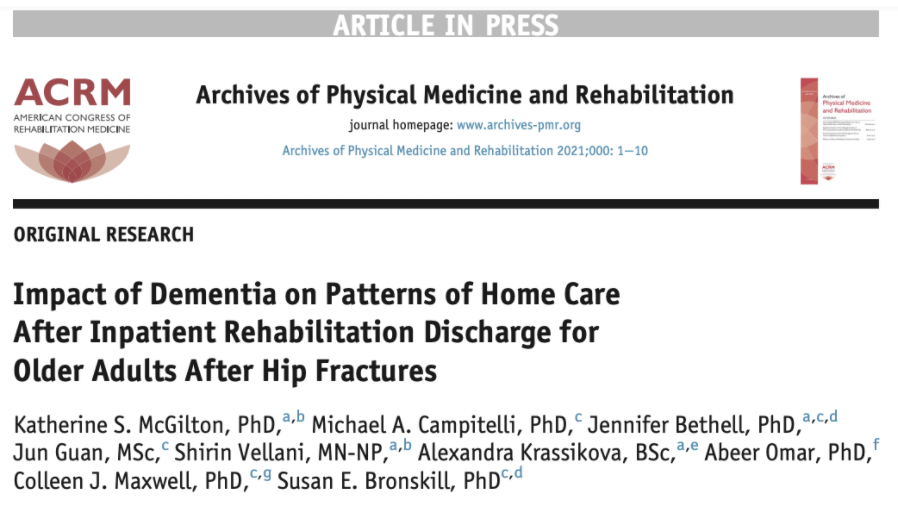Models of Care
We have been working with clinicians, policy decision makers, and persons with lived experience to understand, develop and evaluate models of care (such as transitional care) that are person-centred, effective and appropriate for older adults in multiple settings.
Transitional Care Programs
-

Understanding transitional care programs for older adults who experience delayed discharge: a scoping review
Katherine S. McGilton, Shirin Vellani, Alexandra Krassikova, Sheryl Robertson, Constance Irwin, Alexia Cumal, Jennifer Bethell, Elaine Burr, Margaret Keatings, Sandra McKay, Kathryn Nichol, Martine Puts, Anita Singh & Souraya Sidani
Many hospitalized older adults cannot be discharged because they lack the health and social support to meet their post-acute care needs. Transitional care programs (TCPs) are designed to provide short-term and low-intensity restorative care to these older adults experiencing or at risk for delayed discharge.
-

Enhancing Our Understanding of Transitional Care Programs
McGilton, K., Vellani, S., Krassikova, A., Cumal, A., Robertson, S., Irwin, C., Bethell, J., & Sidani, S.
Many hospitalized older adults experience delayed discharge. Transitional care programs (TCPs) provide shortterm care to these patients to prepare them for transfer to nursing homes or back to the community. There are knowledge gaps related to the processes and outcomes of TCPs.
-

Assessing determinants of perceived quality in transitions for people with dementia: A prospective observational study
Drummond, N., McClearly, L., Garcia, L., McGilton, K.S., Molnar, F., Dalziel, W., Xu, T.J., Turner, D., Triscott, J., Freihit, E.
The trajectory of dementia through time is characterized by common transitions which are difficult for persons with dementia (PWDs) and their families and friends. Our study sought to identify determinants for the quality of transition outcomes.
Rehabilitation for Persons with Cognitive Impairment
-

Context matters when implementing patient centred rehabilitation models for persons with cognitive impairment: a case study
Katherine S. McGilton, Alexia Cumal, Dana Corsi, Shaen Gingrich, Nancy Zheng & Astrid Escrig-Pinol
There is a growing number of older adults with cognitive impairment (CI) that require inpatient rehabilitation, and as such patient centred rehabilitation models have been developed. However, implementing evidence-based models without attending to the fit of the model to the new context could lead to an unsuccessful outcome.
-

Healthcare Professionals' Perspectives on Rehabilitating Persons with Cognitive Impairment
Katherine S McGilton, Shirin Vellani, Nancy Zheng, Daniel Wang, Lydia Yeung, Astrid Escrig-Pinol
Many hospitalized older adults cannot be discharged because they lack the health and social support to meet their post-acute care needs. Transitional care programs (TCPs) are designed to provide short-term and low-intensity restorative care to these older adults experiencing or at risk for delayed discharge.
-

Best practices for rehabilitation for older adults with dementia: Implementation of person-centered care
Katherine S McGilton, Shirin Vellani, Nancy Zheng, Daniel Wang, Lydia Yeung, Astrid Escrig-Pinol
Despite emerging evidence that older adults with cognitive impairment including those with dementia can be rehabilitated following a hip fracture, there is a paucity of research on strategies staff use and the support required to effectively rehabilitate this cohort. This qualitative study explores healthcare professionals’ perspectives of providing rehabilitation for older adults with cognitive impairment.
-

Impact of Dementia on Patterns of Home Care Following Inpatient Rehabilitation Discharge for Older Adults After Hip Fractures
Katherine S McGilton, Michael A Campitelli, Jennifer Bethell, Jun Guan, Shirin Vellani, Alexandra Krassikova, Abeer Omar, Colleen J Maxwell, Susan E Bronskill
Objective: To describe differences in home care use in the 30 days after discharge from inpatient rehabilitation after a hip fracture among older adults with dementia compared with those without dementia.
-

Frailty assessment and interventions for community-dwelling older adults: a rapid review
Shirin Vellani, Alexia Cumal, Christine Degan
Frailty is a syndrome involving increased vulnerability that usually develops from age-related decline in physiological reserves and function in multiple organ systems, resulting in an impaired ability to respond to acute changes in health conditions.
-

The Influence of Health and Social Supports on Outcomes Post Rehabilitation for Hip Fracture Surgery: Systematic Review
Katherine McGilton, Shirin Vellani, Melanie Bayly, Elizabeth Tanjong-Ghogomu, Andrea Iaboni, Julie Lapenskie, Vivian Welch, and Abeer Omar
Older adults who sustain hip fractures encounter physical and functional decline after discharge from inpatient rehabilitation. Currently, a synthesis of literature is lacking on health and social supports that may impact outcomes in the community-dwelling older adults, post-discharge from rehabilitation.
-

Factors that influence reintegration into normal living for older adults 2 years post hip fracture
McGilton, K.S, Stewart, S., Chu, C, Omar, A., Blodget, M. Davis, A.
This study aims to identify factors that influence older adults’ reintegration to normal living 2 years following a hip fracture and the association between caregiver burden and reintegration over time.
-

In Conversation with Dr. Katherine McGilton: Identifying Interventions/Models of Health Care Delivery
Host/Event: IFA Global Cafe
Location: Online
Date: April 23rd, 2021
Click the video on the right to watch
Palliative Approach to Care
-

Complexity of Nurse Practitioners’ Role in Facilitating a Dignified Death for Long-Term Care Home Residents during the COVID-19 Pandemic
Vellani, Shirin; Boscart, Veronique; Escrig-Pinol, Astrid; Cumal, Alexia; Krassikova, Alexandra; Sidani, Souraya; Zheng, Nancy; Yeung, Lydia; McGilton, Katherine S.
Due to the interplay of multiple complex and interrelated factors, long-term care (LTC) home residents are increasingly vulnerable to sustaining poor outcomes in crisis situations such as the COVID-19 pandemic. While death is considered an unavoidable end for LTC home residents, the importance of facilitating a good death is one of the primary goals of palliative and end-of-life care.

